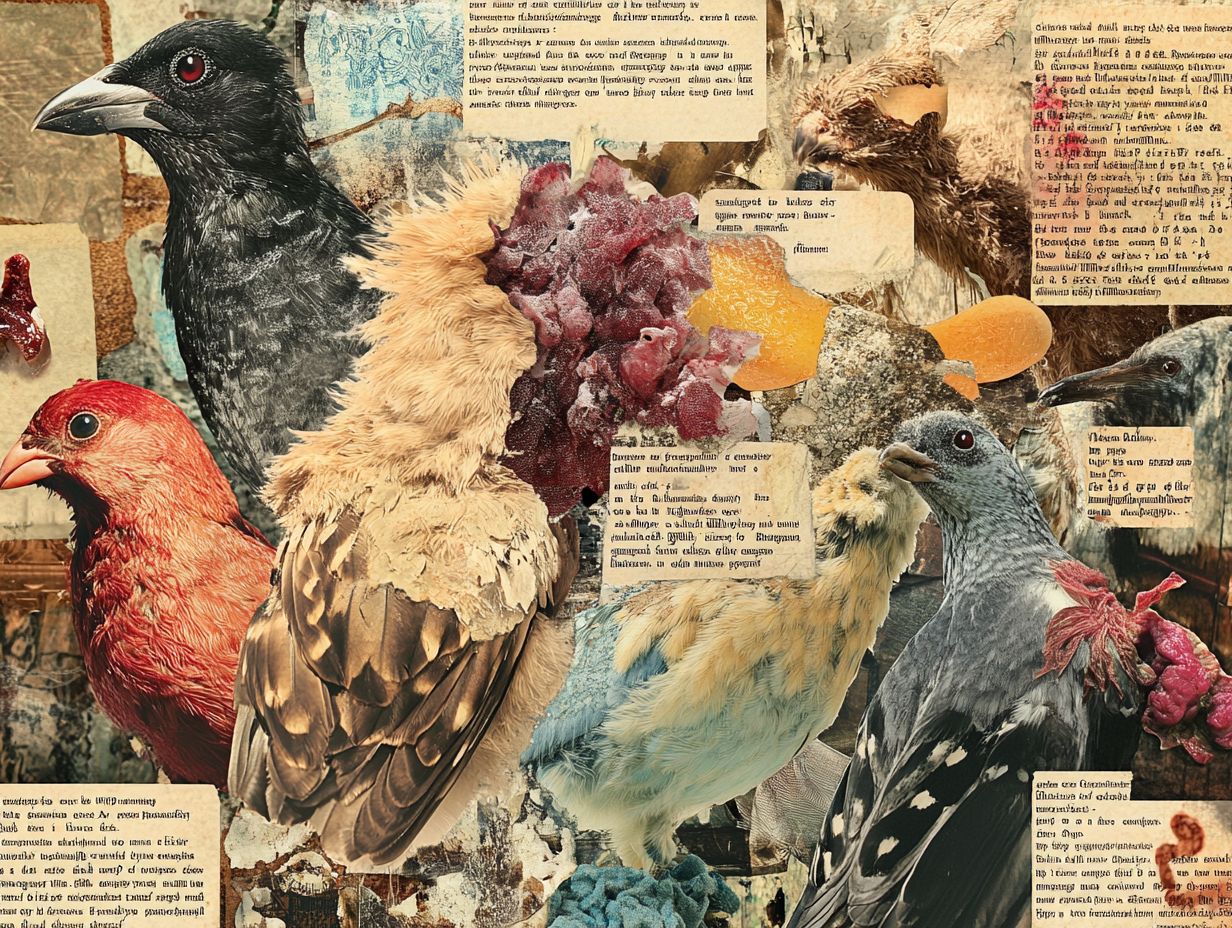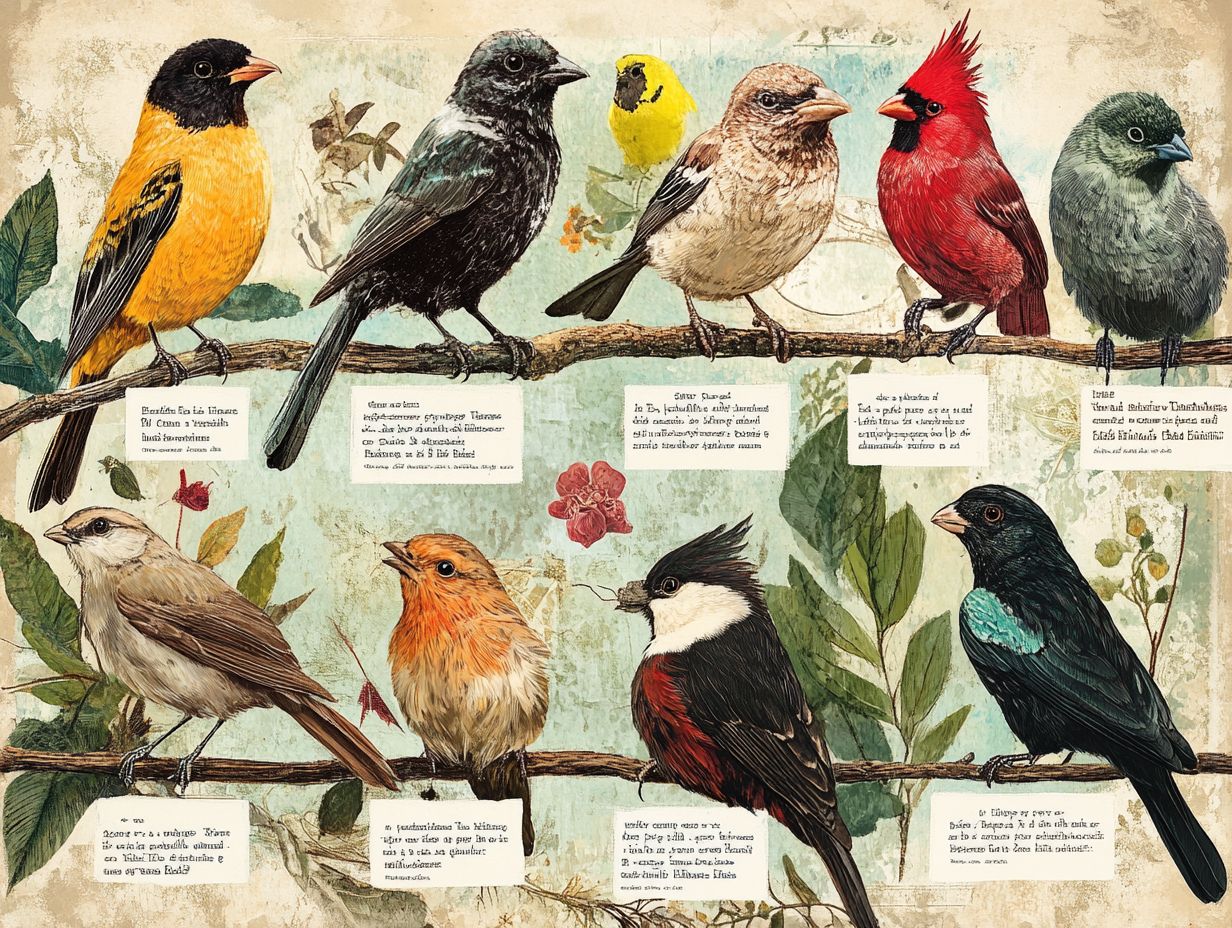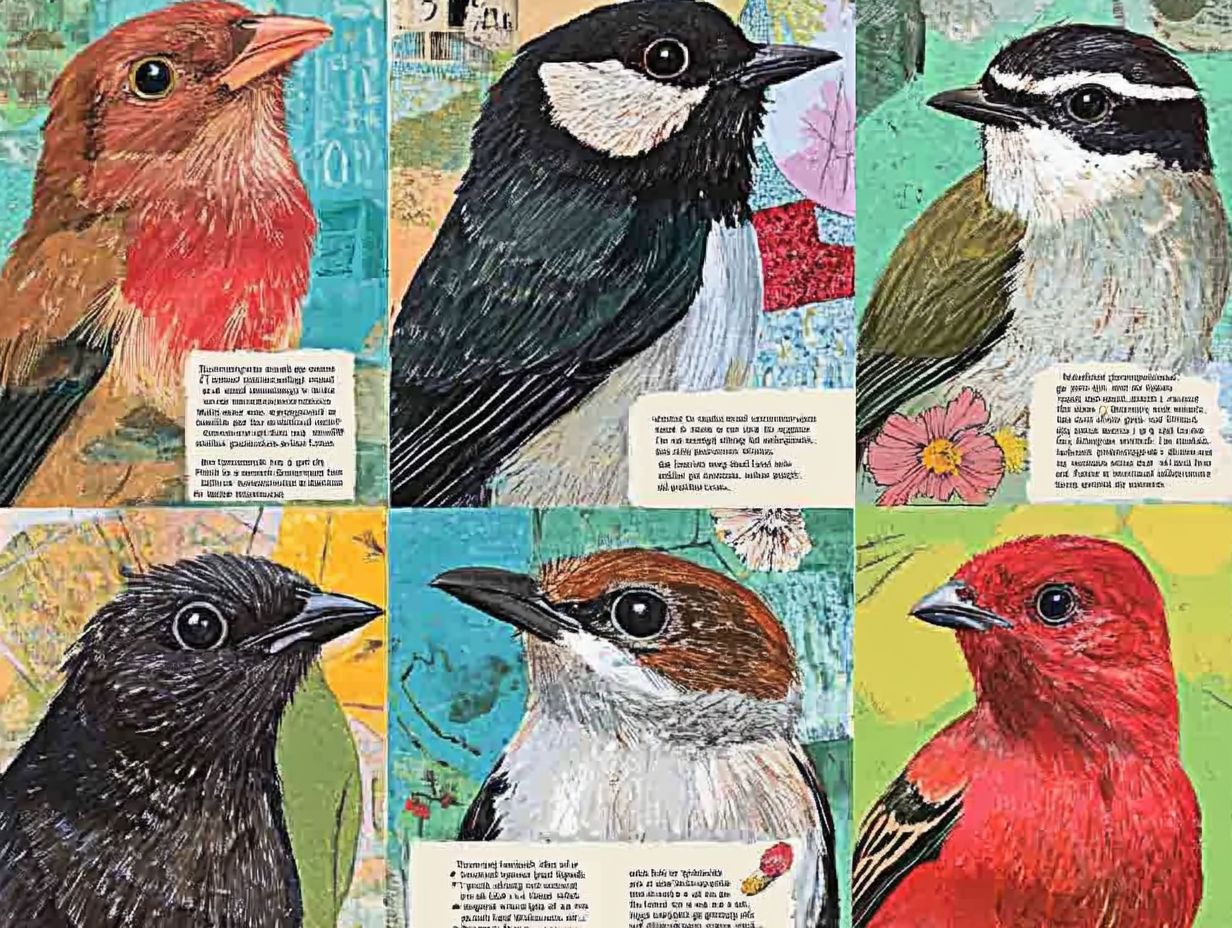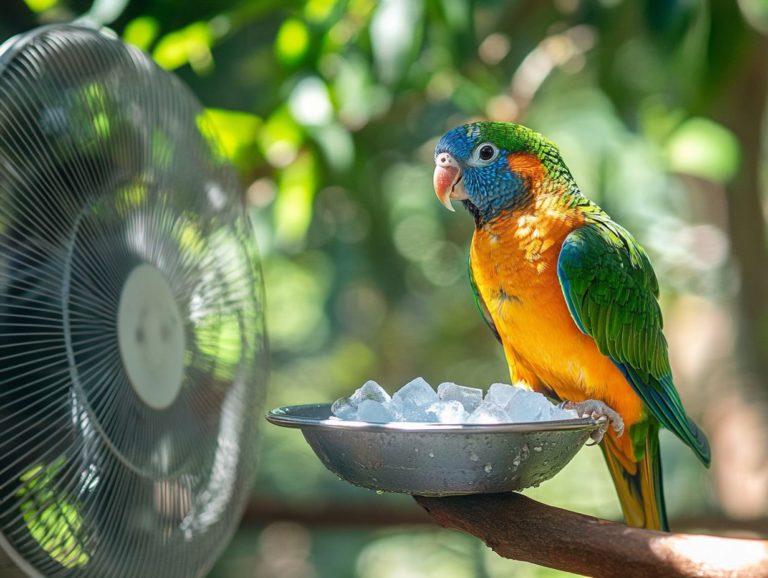Common Avian Diseases and Their Symptoms
Understanding avian diseases is essential for you as a bird owner or enthusiast. These illnesses can impact your feathered friends in numerous ways, often revealing themselves through distinctive physical and behavioral symptoms.
This article delves into common avian diseases, guiding you on how to recognize their signs and implement crucial preventive measures to protect your birds. It addresses effective treatment options while highlighting the potential risks these diseases can pose to human health.
Engage with us to enhance your ability to care for your avian companions.
Contents
Key Takeaways:

- Avian diseases can affect birds of all types and can also pose a risk to human health.
- Physical and behavioral changes, such as weight loss and changes in food and water intake, can indicate the presence of an avian disease.
- Preventive measures such as proper hygiene and nutrition, as well as prompt treatment, can help reduce the risk of avian diseases in birds and humans.
What are Avian Diseases?
Avian diseases encompass a range of health issues that can affect your poultry, including chickens, ducks, and turkeys. These ailments arise from various infectious agents and environmental factors.
Among the most significant are avian influenza divided into highly pathogenic and low pathogenic forms and other conditions such as Newcastle disease, pullorum-typhoid, and salmonella infections. For poultry owners and veterinarians, understanding these diseases is vital, as they can lead to considerable economic challenges and impact animal health.
The causes of these conditions can be quite diverse, ranging from viruses and bacteria to parasites and nutritional deficiencies. Each requires a customized approach for effective management.
Veterinary diagnosis is crucial; it helps you identify health issues early, enabling prompt treatment and informing your preventative strategies.
Implementing strong safety practices is essential for protecting your birds from disease. This includes controlling access to poultry areas and keeping everything clean.
Remain vigilant, watching for symptoms like lethargy, decreased appetite, and unusual droppings. Early detection can significantly improve outcomes for your affected birds.
Common Symptoms of Avian Diseases
Recognizing the common symptoms of avian diseases is crucial for you as a poultry owner or veterinarian. For more information on this topic, consider dealing with common bird health problems. Prompt diagnosis and treatment safeguard the health of your flock and prevent severe outbreaks.
Early identification is your best ally in maintaining a thriving poultry operation.
Physical and Behavioral Indicators
Physical and behavioral indicators of avian diseases can appear in various forms, such as changes in plumage condition, unusual vocalizations, and altered feeding habits. Each of these can point to potential health issues in your poultry and may indicate serious conditions caused by mites, lice, and protozoa.
Feather loss, in particular, should raise red flags, as it often signifies underlying deficiencies or infections that could profoundly affect a bird’s overall well-being. Keep an eye out for any swelling, especially around the eyes or beak; this may indicate systemic infections or parasites at play.
Respiratory distress characterized by labored breathing or coughing should never be dismissed, as it could be a warning sign of serious health complications.
On the behavioral side, a sick bird may start to withdraw from the flock, showing signs of isolation and a decrease in social interaction, along with a noticeable drop in activity levels. Recognizing these critical signs is crucial for ensuring timely intervention and effective treatment.
Preventing Avian Diseases

Preventing avian diseases is an essential responsibility for poultry owners. It demands the implementation of thorough safety practices to effectively minimize the risk of disease spread and safeguard the health of your flock.
Key Preventive Measures
Implementing key preventive measures is crucial for poultry owners. This safeguards your flock from various avian diseases while ensuring both animal health and economic viability against outbreaks of infectious bronchitis.
To achieve this, prioritize limiting both direct and indirect contact with wild birds, as they often carry harmful pathogens. Maintaining clean facilities is also vital. Regular cleaning and disinfecting of coops, feeding equipment, and water sources significantly minimizes the risk of disease transmission.
Establish a strict protocol for introducing new birds to prevent potential diseases from infiltrating your existing flock. Veterinarians are crucial for offering expert guidance on biosecurity measures, conducting health assessments, and developing tailored health management plans to suit your unique farm.
Treating Avian Diseases
Treating avian diseases requires a nuanced approach. This includes effective treatment options such as thorough veterinary diagnosis alongside the strategic use of antibiotics and vaccines. Each method is carefully designed to address the specific disease and its severity, ensuring the best possible outcome for your feathered companions.
Effective Treatment Options
Effective treatment options encompass a range of therapies, from antibiotics to vaccines, specifically designed to combat infectious agents and bolster disease resistance in poultry. This includes strains of Escherichia coli and Mycoplasma gallisepticum.
In avian health, assess whether a bacterial infection is present, as this will guide your decision regarding antibiotic use. These medications dramatically alleviate symptoms and prevent disease spread within your flock. Vaccines are equally crucial in your preventive care arsenal, as they help control outbreaks of various viral pathogens by preparing the immune system to respond effectively.
Timely veterinary diagnosis is essential. Catching issues early allows for a more precise treatment approach, ensuring optimal outcomes for both individual birds and the entire population.
Avian Diseases and Human Health

Avian diseases, especially avian influenza and salmonella infection, present significant zoonotic risks diseases that can spread from animals to humans. This underscores the necessity of monitoring poultry health for the well-being of the animals and the safety of the public.
Your diligence in this area is crucial for ensuring both animal welfare and community health.
Potential Zoonotic Risks
The potential zoonotic risks linked to avian diseases, such as avian influenza and salmonella, require strict hygiene and biosecurity practices to prevent transmission to humans.
These diseases can easily spread through direct contact with infected birds or contaminated environments. Awareness and proactive preventive measures are essential. If you work closely with poultry whether as a farmer or a veterinarian stay alert! You must spot symptoms early to protect your flock.
Vaccination is vital, not only for safeguarding poultry populations but also for protecting yourself and others who may come into contact with these birds. By adopting rigorous hygiene standards, you can significantly reduce the likelihood of infection, ensuring the health of both the birds and their human caretakers.
Frequently Asked Questions
What are some common avian diseases and their symptoms?
Common avian diseases include avian influenza, which may cause fever and coughing, and avian pox, known for causing skin lesions. To learn more about how to identify common bird diseases, it’s crucial to stay informed about these conditions.
How can I tell if my bird is sick with a common avian disease?

Look for signs that your bird might be sick. Changes in behavior, like less activity or appetite, and symptoms like sneezing, diarrhea, or losing feathers can indicate a problem.
Can avian diseases be transmitted to humans?
Some avian diseases can be passed to humans, such as avian influenza. The risk is low but can be minimized by practicing good hygiene and staying away from sick birds.
What preventative measures can I take to protect my birds?
You can take several steps to keep your birds safe. Keep their living spaces clean, maintain good practices to prevent disease, and provide a nutritious diet.
What should I do if I suspect my bird is sick?
If you think your bird might be sick, act fast! Isolate them from others and get veterinary help right away.
Can avian diseases be treated?
In some cases, avian diseases can be treated with medications and support. Always consult a veterinarian for the right diagnosis and treatment options.






